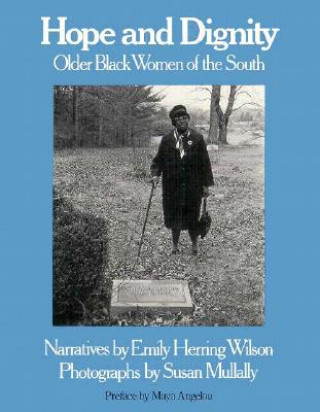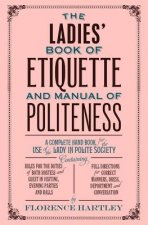
Kód: 05081918
Hope And Dignity
Autor Emily Herring Wilson
"From the Foreword" by Maya Angelou in "Hope and Dignity", Emily Wilson and Susan Mullally have offered some answers to the question of Black survival. Wilson, a good and recognized poet, traveled her adopted State of North Caroli ... celý popis
- Jazyk:
 Angličtina
Angličtina - Vazba: Brožovaná
- Počet stran: 224
Nakladatelství: Temple University Press,U.S., 1992
- Více informací o knize

1021 Kč
Dostupnost:
50 % šance Máme informaci, že by titul mohl být dostupný. Na základě vaší objednávky se ho pokusíme do 6 týdnů zajistit.
Máme informaci, že by titul mohl být dostupný. Na základě vaší objednávky se ho pokusíme do 6 týdnů zajistit.Prohledáme celý svět
Mohlo by se vám také líbit
Darujte tuto knihu ještě dnes
- Objednejte knihu a zvolte Zaslat jako dárek.
- Obratem obdržíte darovací poukaz na knihu, který můžete ihned předat obdarovanému.
- Knihu zašleme na adresu obdarovaného, o nic se nestaráte.
Informovat o naskladnění knihy
Zadejte do formuláře e-mailovou adresu a jakmile knihu naskladníme, zašleme vám o tom zprávu. Pohlídáme vše za vás.
Více informací o knize Hope And Dignity
Nákupem získáte 102 bodů
 Anotace knihy
Anotace knihy
"From the Foreword" by Maya Angelou in "Hope and Dignity", Emily Wilson and Susan Mullally have offered some answers to the question of Black survival. Wilson, a good and recognized poet, traveled her adopted State of North Carolina (she is originally from Georgia) talking to older Black women and listening to their responses. Interestingly, the women collected in this book appear to be speaking more to their ancestors and even to their unborn progeny than to Emily Wilson and therein must lie the book's success. For, since Wilson is White, it is natural to suspect anything Black people might say to her. (There is the old saying among Blacks: "If white people ask you where you are going tell them where you've been.") It is a compliment to Wilson to say that she was wise enough to pose her questions then stand aside so that the women could reflect privately on the pasts they have lived and even those they wished they had lived. Mullally's photographs are inspired and to the point, she has demonstrated as much sensitivity as Wilson and an equal amount of poetic curiosity. The subjects appear, as out of a mist, suddenly clear and clearly mistresses of their real and imagined times. They have overcome the cruel roles into which they had been cast by racism and ignorance. They have wept over their hopeless fate and defied destiny by creating hope anew. They have nursed, by force, a nation of hostile strangers, and wrung from lifetimes of mean servitude and third class citizenship a dignity of indescribable elegance. "If I had it to do over," Mrs. Bryant explains, "I would just as soon have the days of back yonder as today. I had. But I'm sure the children can have so much more and so much more easier till this is better days for living but not the kind of living we was brought up with. We had time to visit each other, and had time to go see the sick and didn't have no thoughts of putting nobody in the rest home. Maybe if there was four or five working on the farm, one could stay at the house and wait on that sick person. And it didn't put no bigger strain on them. Now it seems like they have keyed up themselves for fine houses, fine furniture, fine cars, fine everything until it takes them both to work (the wife and the husband). "But used to if the man had to be sick, the woman with the neighbor's aid could carry on. Or if the woman had to be sick, the neighbors would help do the chopping or do whatever she had been doing till she could get well. Now there's no way that no one hardly, the way they've got themselves stretched out for wanting so much, that they can carry on as well as we did. When mother stays at home with the children and works with them, like I did, you near about know them. No way hardly they can fool you or nothing. I'm not giving myself no pat, but nobody worked more hours than I did." These women are teachers comprehensively. Their accounts inform us that while life in North Carolina and in all the United States, has been hard for the Black woman (and man and child) it can be borne with dignity, and it can be changed by hope. Salutes to Wilson and Mullally, and humble thanks to all the women collected in this book. I understand them. They are my grandmothers."
 Parametry knihy
Parametry knihy
Zařazení knihy Knihy v angličtině Society & social sciences Society & culture: general Social groups
1021 Kč
- Plný název: Hope And Dignity
- Podnázev: Older Black Women of the South
- Autor: Emily Herring Wilson
- Jazyk:
 Angličtina
Angličtina - Vazba: Brožovaná
- Počet stran: 224
- EAN: 9781566390170
- ISBN: 1566390176
- ID: 05081918
- Nakladatelství: Temple University Press,U.S.
- Hmotnost: 426 g
- Rozměry: 229 × 179 × 15 mm
- Datum vydání: 31. August 1992
Oblíbené z jiného soudku
-

Women Who Run with the Wolves
224 Kč -

Freedom Writers Diary
389 Kč -

Think Like a Monk
283 Kč -

Orientalism
323 Kč -

How Europe Underdeveloped Africa
525 Kč -

Desert Flower
302 Kč -

Why Does He Do That?
433 Kč -

Letters to a Young Muslim
303 Kč -

Eros and Mysteries of Love
423 Kč -

Life After Darkness
540 Kč -

Puer Tea
947 Kč -

Womanhood
543 Kč -

JFK - 9/11
734 Kč -

Complete Book of Pilates for Men
463 Kč -

Colloquial Yiddish
1682 Kč -

Servitors of Empire
481 Kč -

Gypsy Identities 1500-2000
1666 Kč -

Sword of No-sword
692 Kč -

Gerotranscendence
3524 Kč -

Northwest Coast Indian Art
732 Kč -

Qur'an
810 Kč -

When God Was A Woman
493 Kč -

The Mastery of Love
309 Kč -

Vintage Menswear
456 Kč -

Who Cooked the Last Supper?
427 Kč -

Women Who Run With The Wolves
433 Kč -

The Way of Men
342 Kč -

The Autobiography of Malcolm X
227 Kč -

Second Sex
284 Kč -

Goddesses in Everywoman
303 Kč -

Talking with Female Serial Killers - A chilling study of the most evil women in the world
276 Kč -

Intellectuals and Society
558 Kč -

Women in the Qur'an
480 Kč -

Erotic Bondage Book
364 Kč -

Zami
302 Kč -

Nine Years among the Indians, 1870-1879
615 Kč -

Dark Emu
356 Kč -

Childhood and Society
394 Kč -

Happy City
303 Kč -

The Male Nude
505 Kč -

The Bell Curve
463 Kč -

We Should All Be Feminists
196 Kč -

Empire of the Summer Moon
356 Kč -

Radium Girls
276 Kč -

Dance of Anger
276 Kč -

Beauty Myth
356 Kč -

Muqaddimah
540 Kč -

TROUBLEMAKER
381 Kč -

Ladies' Book of Etiquette and Manual of Politeness
381 Kč
Osobní odběr Praha, Brno a 12903 dalších
Copyright ©2008-24 nejlevnejsi-knihy.cz Všechna práva vyhrazenaSoukromíCookies



 Vrácení do měsíce
Vrácení do měsíce 571 999 099 (8-15.30h)
571 999 099 (8-15.30h)